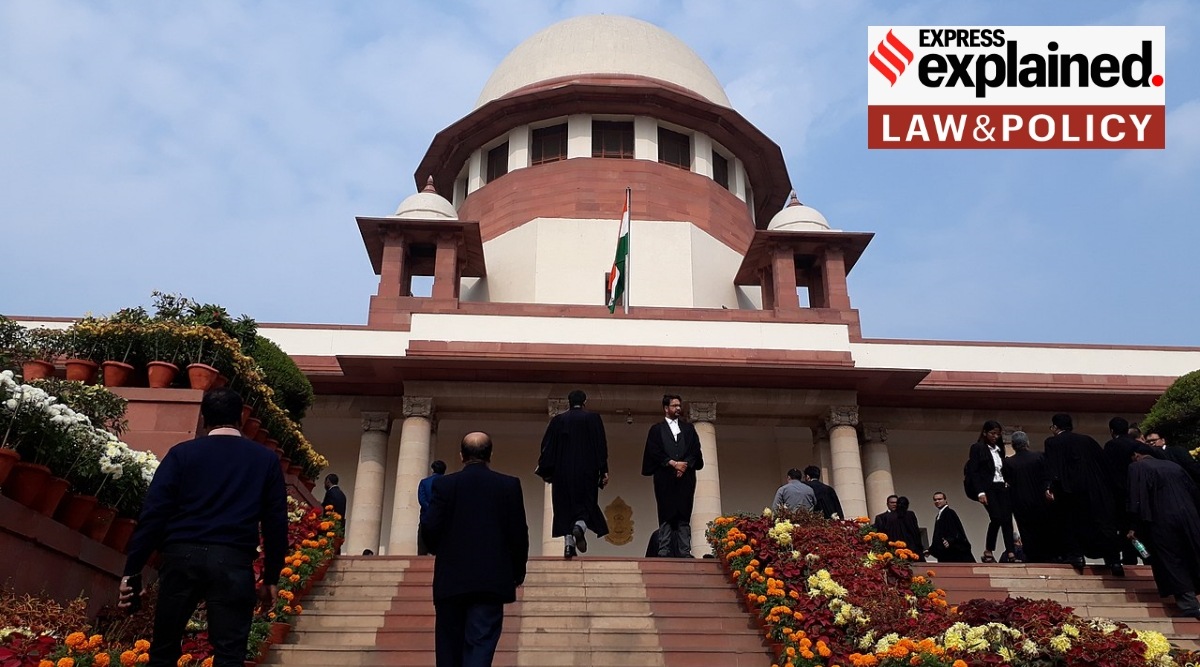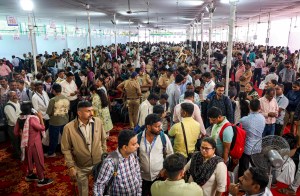New guidelines for designation of senior advocates in the SC: What they say
The new guidelines prescribe the minimum age as 45 years to apply for the ‘senior advocate’ designation. This age limit may, however, be relaxed by the Committee, the Chief Justice of India, or a Supreme Court judge if they have recommended an advocate’s name.
 The new guidelines prescribe the minimum age as 45 years to apply for the ‘senior advocate’ designation. This age limit may, however, be relaxed by the Committee, the Chief Justice of India, or a Supreme Court judge if they have recommended an advocate’s name. (Wikimedia Commons)
The new guidelines prescribe the minimum age as 45 years to apply for the ‘senior advocate’ designation. This age limit may, however, be relaxed by the Committee, the Chief Justice of India, or a Supreme Court judge if they have recommended an advocate’s name. (Wikimedia Commons) The Supreme Court has published new guidelines for the designation of senior advocates practicing mainly in the Apex Court. These guidelines come after the May 12 ruling delivered by a three-judge bench led by Justice SK Kaul in a case seeking modification in the conferment of ‘senior advocate’ designation guidelines rendered in a 2017 SC ruling.
In doing so, the Bench, also comprising Justices Ahsanuddin Amanullah and Aravind Kumar, replaced the guidelines issued by the top court in 2018, in the aftermath of its 2017 ruling in Indira Jaisingh v. Union of India.
What do the new guidelines say?
The new guidelines prescribe the minimum age as 45 years to apply for the ‘senior advocate’ designation. This age limit may, however, be relaxed by the Committee, the Chief Justice of India, or a Supreme Court judge if they have recommended an advocate’s name.
However, no minimum age was prescribed under the 2017 guidelines or even the May 12 SC ruling, which said that “although designations in the Supreme Court in comparison to High Courts have usually taken place at the age of 45 plus, younger advocates have also been designated,” while leaving the final decision in the hands of the Permanent Committee and the Full Court.
Although the 2017 guidelines say that the CJI along with “any judge” can recommend an advocate’s name for designation, the 2023 guidelines specify that the CJI along with “any Judge of the Supreme Court” may recommend in writing the name of an advocate for designation.
Previously, the guidelines stated that 15 marks were set aside for publications. However, keeping in line with the May 12 ruling, the new guidelines state that only 5 marks will be given for “publication of academic articles, experience of teaching assignments in the field of law,” and “guest lectures delivered in law schools and professional institutions connected with law” combined.
Besides this, the weightage given to reported and unreported judgements (excluding orders that do not lay down any principle of law) has increased from 40 to 50 points in the new guidelines. This direction was also laid down in the May 12 ruling.
What are the 2018 guidelines?
In October 2018, the Apex Court released a list of “Guidelines to Regulate the Conferment of Designation of Senior Advocates” while acting on a plea filed by India’s first woman Senior Advocate, Indira Jaising, for greater transparency in the designation process. The guidelines discouraged the system of ‘voting by secret ballot”, except in cases where it was “unavoidable.”
According to the 2018 guidelines, a “Committee for Designation of Senior Advocates,” or “permanent committee,” was created and empowered with powers of conferment. The CJI-chaired committee was to consist of two senior-most SC judges, the Attorney General of India, and a “member of the Bar” nominated by the chair and other members. The Committee was to meet twice a year, at least.
The CJI or any other judge could recommend the name of an advocate for designation. Alternatively, advocates could submit their applications to the “Permanent Secretariat”, which would evaluate them on criteria like 10–20 years of legal practice, be it as an advocate, district judge, or judicial member of an Indian tribunal where the qualification for eligibility is not less than that prescribed for a district judge.
What did the court decide in the Indira Jaising case?
On October 12, 2017, a three-judge bench of the Apex Court headed by then-Justice Ranjan Gogoi laid down guidelines for itself and all High Courts on the process of designating senior advocates. Jaising had challenged the existing process as “opaque”, “arbitrary,” and “fraught with nepotism.”
Prior to this, Section 16 of the Advocates Act, 1961, governed the appointment of senior advocates. Section 16 (1) stated, “There shall be two classes of advocates, namely, senior advocates and other advocates.” Besides this, Section 16 (2) allowed an advocate to be designated as a senior advocate if he consented to it and “if the Supreme Court or a High Court” was of the opinion that by “virtue of his ability, standing at the Bar, or special knowledge or experience in law, “he is deserving of such distinction.” Further, it was the Chief Justice and the judges who designated an advocate as a ‘senior’ advocate.
It was this ruling that decided the setting up of a “permanent committee” and a “permanent secretariat”, a body tasked with receiving and compiling all applications for designation with relevant data, information, and the number of reported and unreported judgments. After this, the proposal for designation is to be published by it on the official website of the concerned court, inviting suggestions and views, which shall then be forwarded to the permanent committee for scrutiny.
The committee then interviewed the candidate and made an overall evaluation based on a point system that gave marks for years of practice, pro-bono work undertaken, judgements, publications, and a personality test. Once a candidate’s name was approved, it was forwarded to the Full Court to decide on the basis of the majority. The Full Court could also recall the designation of a senior advocate.
Why are the guidelines being changed?
In February 2023, the Central Government sought to change guidelines for the designation of senior lawyers, issued by the Supreme Court after the 2017 ruling. For this, it filed an application for modification before the SC on February 16.
Looking to revisit parameters for determining the designation of senior advocates, the Centre cited the 74th paragraph of the 2017 ruling (Para. 36 in the main judgement), which acknowledged that the guidelines are not exhaustive and left them “open for consideration by this Court at such point of time that the same becomes necessary.”
In its application, the Central Government aimed at modifying the 2017 order on the designation guidelines for lawyers based on a “point-based system”, which awarded 40% weightage to publications, personality, and suitability gauged through the interview. The Centre argued that this system is subjective, ineffective, and dilutes the “esteem and dignity of the honour being conferred traditionally.”
The application pointed to the rampant circulation of “bogus” and “sham” journals where people could publish their articles without any academic evaluation of the contents and quality of the articles, by “paying a nominal amount”.
The titles ‘Senior Counsel, ‘Senior Advocate, and ‘King’s Counsel’ are traditionally bestowed on distinguished lawyers practising in current or former Commonwealth countries or jurisdictions who the “court feels deserve such an “honour” and recognition” owing to their exceptional competence, contribution to the development of law, advocacy, and several other factors, the Centre argued in its application.
Further, the Centre argued that the current requirements for designation are “extraneous” and have resulted in “ousting otherwise eligible candidates” based on factors that are “not germane to the issue of being designated as a Senior Advocate.
Finally, the application sought to reinstate the rule of a simple majority by a secret ballot, where the judges can express their views about the suitability of any candidate “without any embarrassment,” reasoning that the secret ballot will minimise campaigning for votes by lawyers.
In its May 12 ruling in ‘Indira Jai Singh vs. Supreme Court of India Through Secretary General’, the top court upheld the interview criteria followed by High Courts and the Supreme Court for designating lawyers as senior advocates but reduced the 15 marks given for the number of publications to 5 marks. The court also clarified that voting by secret ballot was meant to be used in exceptional circumstances, adding that if it has to be resorted to, the reasons for the same should be recorded.
The court also said that the criteria should not just be restricted to authorship of academic articles but instead “must also include teaching assignments or guest courses delivered by advocates at law schools” as it “would be a more holistic reflection of the advocate’s ability to contribute to the critical development of the law” and shows interest in guiding or helping one’s peers at the Bar.
- 01
- 02
- 03
- 04
- 05






































